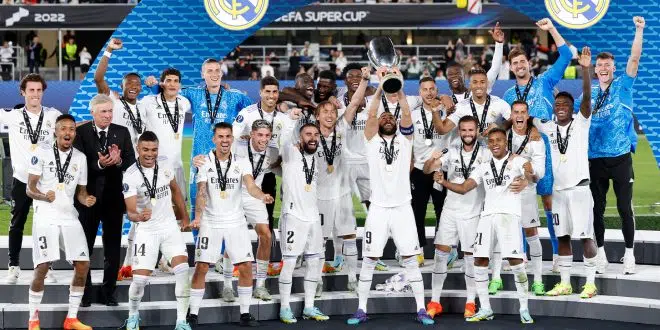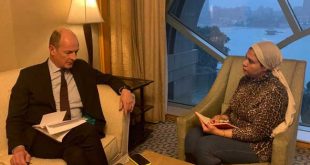Interviewed by: Abdallah Homouda
At a challenging time for Egypt, as the country tries to discard past practices which have held it back and to build on the will for change generated by the popular uprising, it is important to have a look at oneself through the eyes of others.
In an era of globalisation no one can live on their own. It is imperative to depart from subjective assessments and deal with life as it really is, not how we might want it to be.
Others’ views may not necessarily be correct nor complete. In most cases these views are generated by limited information sources and subjective perceptions of the world. But knowing and understandingwhat others think of you is a vital step towards achieving constructive engagement and co-operation.
In this spirit, The Times of Egypt has been keen to explore the British view of the current state of affairs in Cairo, through the eyes of Mr Crispin Blunt, MP; the chairman of the House of Commons foreign relations committee.
Q – Your close interest in the Middle East is well known. You have made several visits to the region which is going through a catastrophic phase for at least 6 years. Could you elaborate on the British interest in the Middle East? How do you see what going on there? And, what do hope could evolve there?
A -This is a wide question. How much of a change has become of life as a result of Brixet? Not very much; is probably the answer. We have a huge interest in the economic success and stability of the region. Both of which, in Egypt, are under terrible pressure. Some might say that the British policy has, in the whole wider region, completely inadvertently, contributed not only to the problems in Egypt, but also in the whole region as we are going to see in the Chilcot report today, which will examine some of the underlying reasons for that.
Q – With regard to Egypt, specifically, I note that it has special place in your interest and that you have visited Cairo twice this year so far. How do you see the situation in Cairo?
A – One of my visits was to open a medical centre on behalf of a friend; a British-Egyptian citizen, who has invested substantial sum of money in that medical centre as well as in connection with the work of the foreign affairs committee, which is inquiring about the British intervention in Libya. It is difficult not to be downbeat about what is happening in Egypt. There is, obviously, the issue of the murder of the Cambridge student Giulio Regeni which hangs over the Italian-Egyptian relations. But this young man was also studying at a British university. And, how he died, obviously, will be seen, as it seems, as outrageous in Italy. He, in a sense, is an example of the culture of impunity of the Egyptian internal security service.
That was what got the Mubarak regime into trouble in the first place. The signs are that President Sisi is trying to address that. But it is just an enormous problem for Egypt. It is related to the whole issue of in the Egyptian society; the lack of civilian control over the military and the role of police and internal security in the society. That is one thing that I would be encouraging my parliamentary colleagues in Egypt to try and carve out a space for themselves by holding those institutions to account.
Q – But you must be aware of the circumstances under which Egypt, currently, lives. The general view is that the country and its institutions are under threat of physical terrorist attack. In that sense, people tend to prioritise what their needs are; security comes before reform.
A – (Interrupting) You could sense that in the atmosphere in Cairo.It was as flat as I could ever experience. The Egyptian spirit just seemed to be at a low point. This may be an exaggerated point, I suspect. But this is reflected in the tourist industry. And, the depressed tourist sector is terribly damaging in the wider Egyptian economy. All these things have become self reporting. Hence, the economic problems to the administration and the Egyptian people.
Q – I see in what you are saying as pointing to the problems in a context of encouragement.However, there is a problem in dealing with terrorism in Egypt. The general view is that the responsibility for terrorism lies on the Muslim Brotherhood organisation. They failed in government and let the country down. Now, their violent opposition to the present government creates a feeling that the whole countryis under threat. This is why the security forces appear as acting in self defence and, sometimes, out of proportion. Is that what you mean?
A – Well, that is part of the tragedy of Egypt. Had the Muslim Brotherhood continued with the way it exercised power to conclusion, it would have got almost electoral raspberry from the Egyptian people at the next election it had to face them; given the state of the country in June and July 2013. Wretchedly, the process was short circuited by the military and the opportunity for that particular form of administration to meet its nemesis on the hand of Egyptian people was not given to them. As a secular liberal, I would much rather the Muslim Brotherhood administration would have been defeated by the Egyptian people rather than by the army.
Q – What about the argument that, had the Muslim Brotherhood remained in power for 4-5 years, the Egyptian people would have never been able to dislodge them. There is the historical analogy with the Nazis; they got to power through elections and the German army failed twice to oust them?
A – I did not get any sense that the issue of civilian control over the military was thought out by President Morsi.I think that he was fairly firmly told that the military were off limit as far as that administration was concerned. And, I got no sense that the situation had changed by 2013 or, indeed, there was any prospect of any change by the end of his term in office. There was obviously a battle in the constitutional court. But I think that anxiety about the fact that they would never be gotten rid of as an administration was over blown. There were some people who were deliberately contributing to the sense of crisis and, there for, making sure that that administration failed.
I think it was going to fail anyway because they were trying to apply a prescriptionto running a modern country based on a 1400 years old understanding of scriptures. This means they were riding for a fall any way. My personal view is that you need a modern government to run a modern country in modern times.
Q – Contrary to constitution and practically speaking, Morsi was seen as “the envoy” of the Muslim Brotherhood to the presidential palace. Major decisions were taken by the Brotherhood Guide General and the Guidance Bureau.
A – And, obviously, one of the challenges was that you have those refreshing opposition movements across North Africa compared to that immature political movement which looked at one stage as if it was going to resist running for the presidency, even though the assessment was that it might win, but with the same margin of 52/48 of the Brexit vote. They decided to run a presidential candidate. Then they could not run thecandidate they wanted. And, we know the history.
We are now conducting an inquiry into political Islam. There are signs in some parts of North Africa, like Tunisia, that their movement is maturing as a political organisation and beginning to identify which bit of philosophy belongs to the mosque and which belongs to the political sphere.
Q – Dr Rashid Ghanoushi (the leader of the Tunisian “Nahdha” movement) is a political operator of high calibre. Prior to his return from London to Tunisia in 2011, he held regular meetings with non-Islamist intellectuals. He appears pragmatic politician but adheres to the same Muslim Brotherhood ideology.
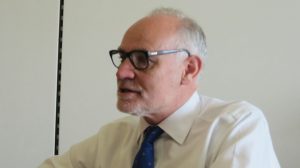
A – Well, fine. The issue is if he is entitled to do that, no one can complain that he is exercising skilled politics contradicting his ideology. The issue is, actually, about protecting your constitution. For the Egyptians, there was anxiety among the people who supported the replacement of the Morsi government on the basis that there would never be another constitution because the constitution had been subverted (by the Morsi presidential decree of November 2012). In a sense, that is what is the army is for. In these circumstances it (the army) was to make sure that the Morsi election was not the last election.
Q – There is a report which was prepared by a reputable British legal firm (called 9 Bedford Row) upon a commission from the Egyptian ministry of justice. Have you seen that report?
A – I think it was submitted to our inquiry.
Q – Which is better preferred; to have religious political parties in power and opposition? Or to convince citizens to commit to the highest religious value system (Muslim, Christian or otherwise) but exercise politics from which everpolitical persuasion they prefer?
A – One side of the coin is looking at political Islam. The fundamental question which I am trying to address is how corral the idea of political Islam which is going to be a part of the political tradition in the Arab world. And Christianity; there has been the Christian democrats in Europe over the last 150 years. How did find their legitimate space within the competition for the people’s support of competing ideas. And, how do you guarantee that the competing ideas; liberal secularism for example, socialism or whatever is there, are going to have their legitimate space. That competition is an on-going one and is not a one that has gone into conclusion.
Q – In your inquiry and the study you are conducting, are you doing them within the new strand of thought known as “the new Orientalism” in mind? This trend, as you may know, is trying to style the Middle East as Islamist and, probably,not in the best Islamic understanding. Bernard Lewis, among others, is an eminent figure of that school.
A – Happily, I do not know much about this to give you a philosophical answer. I am just a humble practicing politician. What I know about Egyptian politics, which is limited to few visits there and conversations with leading Egyptians, is that the ideasto which I subscribe have a market in Egypt and in time they could win significant support. But the liberal parties which are aligned with my thoughtare minute in Egypt. And, they all fight each other.
Q – Unfortunately, they are not mature enough and they were created under Sadat and Mubarak. Mubarak only allowed the Muslim Brotherhood and other Islamist affiliates to flourish in order to frighten the West of the alternative.
A – And, his own party, obviously, was an establishment organisation, rather in a strong parallel with the party which was put in together in Russia to support the administration. No doubt there will come a time when that party would collapse in a such spectacular fashion as the Mubarak party.
Q – I had a similar discussion at the Foreign Office and I noticed that, behind the diplomatic language adopted towards Egypt, there is something like a low level feeling in the relationship with Egypt. Not the warmth that someone like me would like to see. I was left with a feeling like that of a troubled child because of a difficult relationship between the two parents. Is that an accurate description?
A – It is really difficult to see and I am depressed about too. It is difficult to see a way out for Egypt from the current difficulties.With support to the president appears to be declining. It looks like elements of the media have beengiven licence to attack him. No one knows where that is coming from. One good thing that you know his conduct of policies is becoming open and subject to criticism which is as if the leadership is becoming accountable to a free media. But that the political institutions which he has created….
Q – (Interrupting) He has inherited them.
A – Point taken. The committee that was formed to draft the constitution which, then, led to an election of a new parliament which 80% or 75% of its members are new. All this is bidding in as to what power they have and how independent from the executive are they. How does the Egyptian parliament begin to advance its independence? I have encouraged my opposite numbers to look at the area of human rights. This is an area where they should be pushing the boundaries and question whether there are gross abuses of power on the part of the security forces. This is exactly the kind of area where they should be standing up for the people whom they represent.
Q – Have you seen Egyptian parliamentarians?
A – We saw Mr Oraby and members of the foreign Affairs committee and had an extremely agreeable discussion.
Q – What do you think of their performance?
A – I do not know enough because I am not following it on a regular basis. All that I know is that I have met some perfectly impressive parliamentarians; just as good as parliamentarians in this (UK) parliament in terms of their personal capabilities. They are trying to change things. They look to me as decent representatives of the people. But they are in an institution that is immature. I am not sure how much authority they might have to acquire. In terms of encouragement, they might have to take the authority for their institution. By law, their institution, formally, does have the authority. But they have toassert it.
Q – As a part of the Egyptian view of threats to the country, there is a major concern about the Libyan border. The situation in Libya is seen as a threat to the Egyptian National security.
A – (Interrupting) And, it is a National threat to Italy too, as well as Tunisia.
Q – Have you discussed this with people in Cairo?
A – Yes, that was the Purpose of the parliamentarian visit.
Q – What was your view of this discussion?
A – Egypt is perfectly a strong partner of the international consensus on Libya. It is part of the consensus on supporting The General National Accord (GNA). However, Mr Heftar is not supporting the GNA and Egypt is supporting him. Someone has to explain that to London
Q – In your view, is there a way of coordinating the Libyan scene?
A – Heftar, as far as I understand, is not submitting to the authority of the defence minister of the GNA. If he was, Libya would not be facing the dire prospect that people seem to be describing.
Q – How is it possible to move from a situation of observing, assessing and criticising to a situation of engaging in order to try and deal with the situation in appositive way?
A – Obviously, on the international level, everything is done properly. The international community is coordinating its positions. They held a meeting in Vienna, chaired by Mr Kerry (the US Secretary of State) and Egypt was part of that overt consensus. But what is happening on the ground in Libya in terms of National agenda which is played out might not be the same.
Isn’t there an exchange of views, information and consultation between Egypt and parties of the international communityin order to coordinate policies?

As far as I know, yes is the answer to that. But whether the Egyptian foreign ministry is playing the same hand like the Egyptian intelligence, you may be better equipped to tell me.
Q – Well, I am really astounded that you believe that Egypt is moving in different contradicting ways.
A – Talking about that, and with understanding of what the French are doing, one may not be particularly surprised that other countries are doing that. There were reports in Le Monde that French special forces soldiers were assisting the Libyan National army under the command of General Heftar; helping out in Benghazi. Those reports were formally denied by the French foreign ministry, in exactly, the same way that the British defence minister was denying reports of involvement of British special forces that was carried out on the front page of The Times. This. In all, looks ridiculous.
Q – The Times report included that the British SAS use Jordanian translators too.
A – Yes, as all this was happening, King Abdullah of Jordan was briefing members of the US congress, trying to explain exactly what is happening and who is playing the international agenda and supporting the international consensus and whether under that people are playing differently; trying to protect their National interest. It is not entirely clear to me in the way that evidence is kicking around suggesting that not everybody is playing an international game.
Q – Are you assuming that co-ordinating with Egypt easier than co-ordinating with France; especially in the light of the EU current situation?
A – Possibly, I think there are similar complexities in both relationships.
Q – I would like to go back to the Muslim Brotherhood issue. A former deputy Guide General, Dr Mohamed Habib, wrote describing the organisation as a ”secretive Islamic Federation with branches (in different countries) which share the same ideological objectives, highly pragmatic, work to reach power and implement Sharia and committed to allegiance and obedience”. In your study of the Muslim Brotherhood, do this is an accurate description?
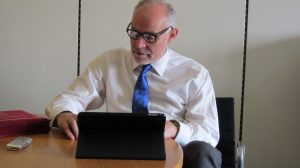
A – As long asthere is a truth in this statement; whether it is the truth or the whole truth. Truth is dependent on the view you are taking.
If you are taking a balanced view of the whole Islamist movement, as well as the Brotherhood itself, that will be a part of the description. And, an element of that I would recognise. They are highly disciplined and committed to obedience. The question would be: is that a revolutionary organisation? As the statement implies, this remains an open question. I think the parallel is that they are more like the Masons or the Bolsheviks.
Q – In my research in the UK National Archives, I saw correspondence from ambassadors to Foreign Secretaries signed as “Your obedientservant”. Doesn’t this kind of subservient thinking mean submission to the leadership. Is such attitude conducive to good politics?
A – This is why I do not like religion. But you can make the same challenge to the Catholics.
Q – But that does not work in a proper political party. Would you have that in the Tory party?
A – (Laughingly) The traditional expression, “Your humble and obedient servant” was something which was used in formal correspondence in the UK when you address a superior. How much of that is courteous ancient language? I was taught,as a military soldier, that if I wrote to a superior, that was how it would end, “I have the honour to be your obedient servant”.

Q – Being originally a military man, and the son of an army general you had spent time in your childhood in the barracks.
A – (interrupting) Well, I was a soldier for 12 years.
Q – I know that, but what I mean is getting familiar with military life in your formative years. This question relates to the politically elected superiority over the military.
A – (Interrupting) This is what is missing in Egypt.
Q – (Continuing) As a military man turned politician, how much do you feel?
A – I feel rather more accuting.
Q – Does this mean humbling or humiliating the military?
A – Well, if one is trying to say that the military need to learn their place in Egypt, the military’s place in Egypt has been all too prominent for too long. And you have got the military control a very substantial slice of the Egyptian economy. There are different claims by different economists as to how much of the economy is controlled by military in Egypt. This is one of the unresolved issues in the Egyptian society. I would be better placed to get into Egyptian politics if I was an Egyptian and stayed in the army rather than get into elected politics in the age of 30.
Q – OK, how much do you feel that the Muslim Brotherhood is a religious umbrella that could cover underneath all schools of “political Islam” as they like to call it; including other behavioural forms described as “radical”, “violent” and “terrorist”?
A – That is why I am doing an inquiry to answer this question in order to address the issue the best way I can. You will see a disciplined answer to that in the report which we will do on political Islam at the end of the inquiry.
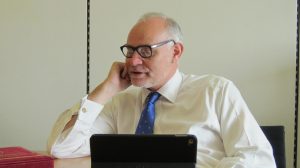
Q – When would you hold that inquiry?
A – I have not got the time table on it. The attention of the foreign affairs committee along with the rest of the country has been directed to the immediate matter of Brexit rather than long term issues. But probably understanding political Islam is essential, especially for everyone taking interest in the Middle East.
Q – The last question. In the light of the globalisation of trade, media, politics and everything else, do you think that the wrong policies adopted in certain regions of the world could enforce the globalisation of terror? Hence, what do you do in other parts of the world could come back to you too; a chicken coming home to roost?
A – I do think that. I do not like to talk success in the maintenance of our values in society actually means maintain these values in action. And, then, when you subvert those values by making a short cut in terms of illegally suppressing people, then things come back to punch you. You can not denigrate it with the protection of rule of law if you then subvert the very rule of law which your democratic institutions have established. For example, the criticism of Western intervention policy in Kosovo and Iraq and the Israeli-Palestinian question as breaches of international law are glaring and overt. This makes us look like hypocrite and invite other people to call us so.





